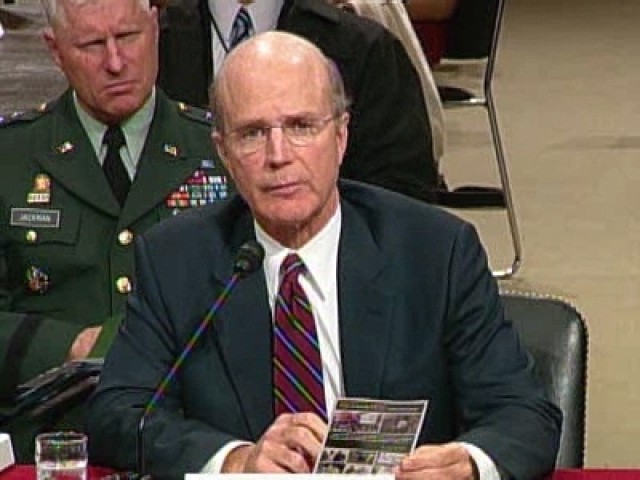WASHINGTON,(AFPS, Nov. 15, 2007) - Out of calamity comes opportunity, Army Secretary Pete Geren told Congress today.
Secretary Geren and Army Chief of Staff Gen. George W. Casey Jr. testified before the Senate Armed Services Committee about the state of the service.
The secretary said that when crisis comes it gives both Congress and the service the political opportunity to do some things that wouldn't get done without the crisis.
"It gives us the political energy, the bureaucratic energy, to take on some hard issues and make some changes that we would never get around to were it not for that," he said.
Two "calamities" have highlighted weaknesses in the Army, and the service is using those to make changes, Secretary Geren said. Shortcomings in soldier health care make up one of those calamities; contracting is the second.
In regard to health care, the Army made immediate changes to conditions at Walter Reed Army Medical Center, the service's flagship medical facility, after shortcomings were brought to light in media reports, the secretary said. The service has established wounded warrior units throughout the United States and is working to reform the disability system. The secretary put great store in a pilot program that begins Nov. 26 to experiment with a single physical for both the departments of Defense and Veterans Affairs.
Contracting is another calamity the service is acting upon. "We have learned -- unfortunately, the hard way -- that our contracting system was not up to the needs of our Army in this century," Secretary Geren said. "In 2007, the Army did 25 percent of all contracting for the government -- $111 billion."
When shortcomings were brought to light, the service put a task force in place "to immediately stop the bleeding," he said. As a result of studies, the service has learned that contracting is a problem throughout government.
"We need to do a better job of developing professional acquisition and contracting officers (and to) provide the resources, the training and valuing the invaluable role that these contracting officers provide to our government," Secretary Geren said.
The service needs more contracting personnel, they need to be better trained, and leaders need to listen to their conclusions, Secretary Geren said.
The secretary also told the Senate panel that the service must do more for military families. "We are in the seventh year of war in Afghanistan and over four and a half years of war in Iraq; this is the third-longest conflict in U.S. history," he said. "It's the longest conflict we've ever fought with an all-volunteer force by quite a long shot.
"We are in uncharted waters, both for the soldiers and for the families," he continued.
This all-volunteer Army is a different force from any the country has fielded before. "More than half of the soldiers are married; more than half of their spouses work outside the home," he said. "The support that we provided to those key members of the all-volunteer force over the first 35 years of the force doesn't work as we move into the seventh year of the conflict."
Army leaders at all levels have signed a covenant with the families "to recognize the importance of our families to the all-volunteer force." Secretary Geren said that families volunteer too, and the military must do a better job supporting them.
"We moved $100 million out of our budget last summer into family programs," he said. "In '08 in the supplemental, we moved $1.4 billion into family programs. We ask your help as we look to support families, that critical part of our all-volunteer force." ]
(Jim Garamone writes for the American Forces Press Service.)


Social Sharing